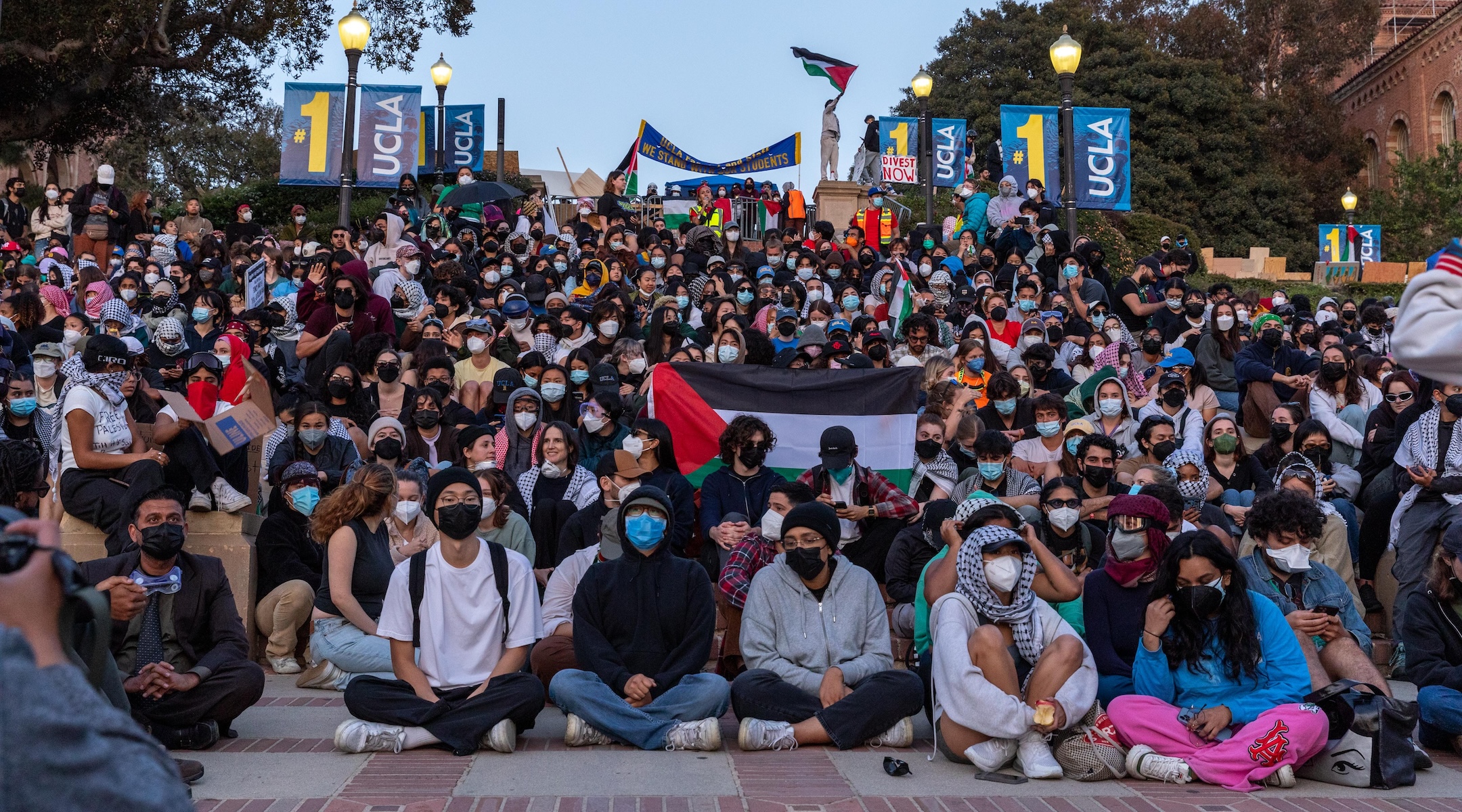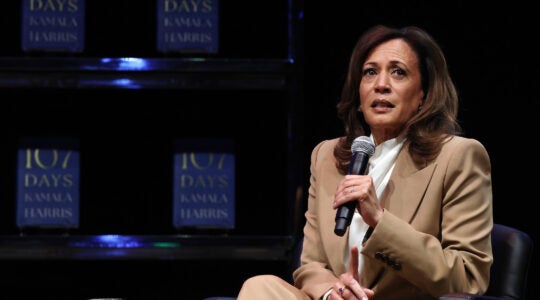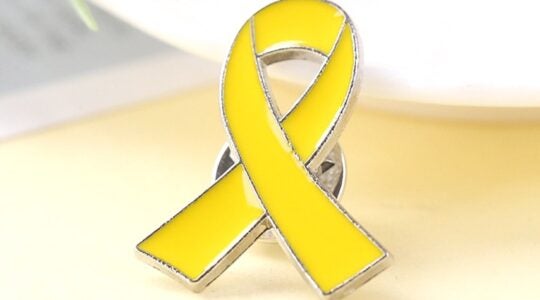A new report from a campus antisemitism task force accused the pro-Palestinian movement at the University of California, Los Angeles of triggering a torrent of abuse directed at Jewish and Israeli students, faculty and staff.
The 93-page report, released Tuesday by UCLA’s Task Force to Combat Antisemitism and Anti-Israeli Bias, said Jews on campus were assaulted and threatened while hateful expressions, including a swastika drawn on a classroom chalkboard and a protest sign that read, “Israelis are native 2 hell,” proliferated amid last spring’s pro-Palestinian encampment movement.
Made up of students and faculty members, the Task Force to Combat Antisemitism and Anti-Israeli Bias at UCLA said the impact of antisemitism and anti-Israel bias on campus could have been lessened if administrators had taken more action against violations of campus rules, such as the ban on camping overnight on university property.
The report said administrators took a light hand out of respect for UCLA’s tradition of free expression, but that this particular protest movement was an aberration of that tradition because it is the first in UCLA history to foster bias and hate against a national, ethnic or religious group.
“The post-October 7th protest movement is different from past movements: it claims to be aimed at protecting Palestinians and demanding greater accountability from the Israeli government, but it has at the same time unleashed hate speech and symbols, bias, and illegal and offensive behavior against Jews and Israelis on campus,” the task force said in the report.
Almost simultaneously with the release of the report, a group of pro-Palestinian campus members condemned UCLA’s leadership for being too harsh in its response to the protesters as they occupied parts of campus to demand the university divest endowment funds from companies doing business with the Israeli military.
The American Civil Liberties Union of Southern California filed a lawsuit Tuesday on behalf of the group over what it regards as an illegal crackdown on free speech.
The lawsuit said protesters’ First Amendment rights were violated by excessive security patrols and overly strict rules culminating in UCLA’s summoning of police to break up the encampment and the arrest of 200 participants, some of whom are facing ongoing student disciplinary proceedings.
The lawsuit adds to the charges of suppression of pro-Palestinian speech presented earlier this year in reports from UCLA’s Task Force on Anti-Palestinian, Anti-Muslim, and Anti-Arab Racism.
The dueling narratives mirror the larger debate over Hamas’ attack on Israel on Oct. 7 of last year and the subsequent war in Gaza as universities throughout the United States have become a hotbed of activism in relation to the war.
UCLA emerged as a major focal point last spring when a mob of counter-protesters attacked the university’s pro-Palestinian encampment. Los Angeles’ mayor and the local Jewish community criticized the university for not immediately summoning police to break up the melee. Several pro-Israel protesters have since been charged with crimes in connection with the violence, including two this week.
That incident is examined alongside other events since Oct. 7 of last year in the antisemitism task force’s report. Protest activity that began soon after Hamas’ attack intensified in the spring to a point that should not have been allowed by campus leaders, the task force said.
By late April, according to the task force, encampment protestors were controlling access to parts of campus, blocking the passage of people who were wearing the Star of David or were suspected of being Zionists.
In August, a group of Jewish students who sued UCLA for failing to ensure their equal access to campus during the encampment secured a ruling in their favor by a federal judge.
As part of its effort, the task force circulated a survey among Jewish students, faculty and staff, by writing to email addresses associated with registered campus Jewish groups. Of the university’s estimated 3,000 Jewish students and an unknown number of employees, 428 responded to the survey.
Although a precise response rate and sampling bias could not be determined, the task force said it is nevertheless confident that the results reflect the range of experiences in the community because respondents come from a diverse array of backgrounds and beliefs.
The report noted that 28 respondents said they were physically assaulted and 74 said they were threatened over the past year. Considerable numbers of students, faculty, and staff members surveyed said they had considered leaving their employment or studies at UCLA because they had been maligned on campus over their Jewish or Israeli identities.
“I’ve chosen to work from home because I don’t feel safe or comfortable on campus,” one person told the task force.
To address the problem, the task force made a series of recommendations in the report, which was submitted to UCLA Interim Chancellor Darnell Hunt, including more training and education, an overhaul of the system for reporting discrimination, and stricter enforcement of laws and policies. The university is reviewing the recommendations, a spokesperson told the Wall Street Journal.
UCLA joins several other universities in releasing findings of task forces formed amid the turmoil since last year. Committees at Columbia, Harvard and Stanford universities have all issued reports documenting antisemitism on campus, concluding that more could have been done to tamp down tensions and urging changes to head off similar problems in the future.
JTA has documented Jewish history in real-time for over a century. Keep our journalism strong by joining us in supporting independent, award-winning reporting.






